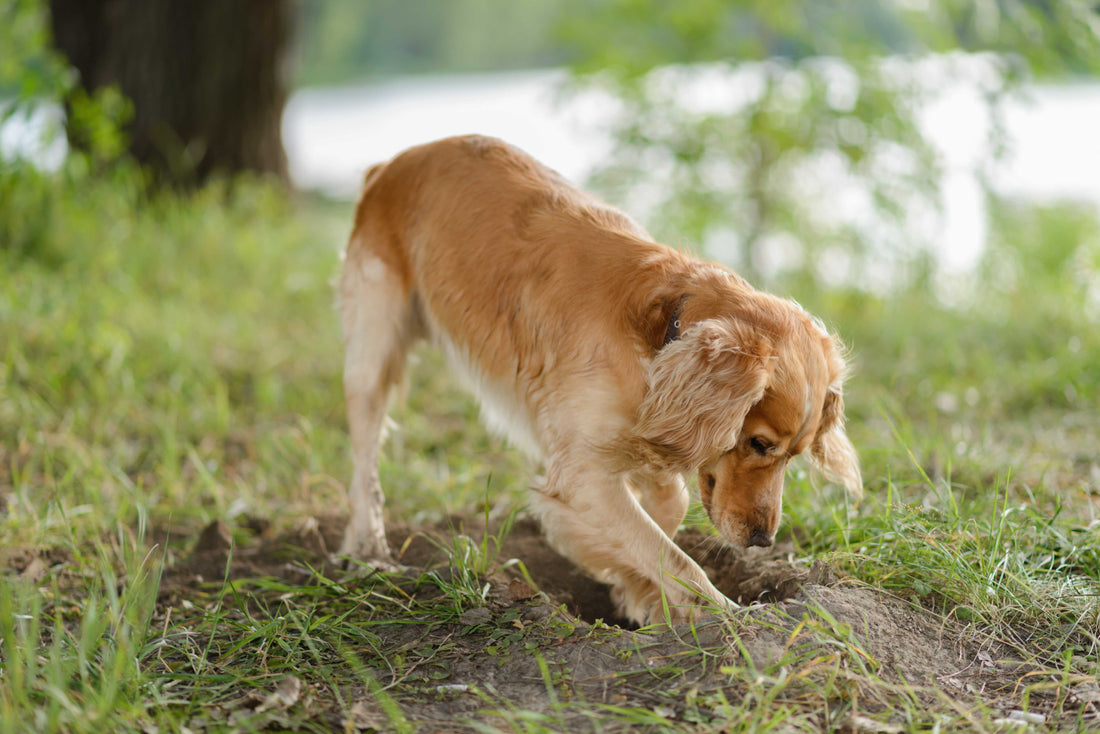Understanding why your pet digs can help you address and manage this behaviour effectively. Pets may dig for various reasons, including boredom, anxiety, hunting instincts, and environmental factors. This blog explores these common triggers and provides practical tips to prevent and manage digging in pets.
Boredom as a Trigger for Digging
Lack of Stimulation
Pets, especially dogs, need mental and physical stimulation to stay happy and healthy. When pets are left alone for long periods without enough interaction or activity, they can become bored. Boredom often leads to destructive behaviours like digging as pets look for ways to entertain themselves.
Preventing Boredom
To prevent boredom-related digging, ensure your pet gets plenty of exercise and mental stimulation. Interactive toys, puzzle feeders, and regular playtime can keep your pet engaged and reduce the urge to dig. Additionally, daily walks and exercise sessions can help burn off excess energy.
Anxiety and Digging
Separation Anxiety
Pets can experience separation anxiety when left alone, leading to behaviours like digging as a way to cope with stress. Dogs, in particular, might dig at doors or windows in an attempt to escape and find their owners.
Stressful Environments
Anxiety can also be triggered by a stressful environment. Loud noises, unfamiliar visitors, or changes in routine can make pets feel anxious, prompting them to dig as a way to alleviate their stress.
Managing Anxiety
Addressing anxiety-related digging involves creating a calm and secure environment for your pet. Establishing a consistent routine, providing a safe space, and using calming products like anxiety wraps or pheromone diffusers can help. If the anxiety is severe, consult your vet for additional advice and possible treatments.
Hunting Instincts
Natural Predators
Some pets have strong hunting instincts that drive them to dig. This behaviour is particularly common in breeds that were originally bred for hunting or burrowing. Pets may dig to catch small animals or insects they sense in the yard.
Channelling Hunting Instincts
To manage digging driven by hunting instincts, provide alternative outlets for these natural behaviours. Engage your pet in activities that simulate hunting, such as playing with fetch toys or participating in scent work or agility training. These activities can satisfy their instincts and reduce the urge to dig.
Environmental Factors
Soil and Landscape
The environment can also influence your pet's digging behaviour. Pets may dig to find a cool spot in hot weather, uncover buried items, or simply because the soil feels good to dig into. Gardens, flowerbeds, and loose soil areas are particularly tempting for pets.
Creating a Digging Zone
Creating a designated digging area can help manage your pet’s digging behaviour. Set up a specific spot in your yard with loose soil or sand where your pet is allowed to dig. Encourage your pet to use this area by burying toys or treats and praising them when they dig in the designated spot.
Blocking Access to Problem Areas
To protect specific areas of your yard, consider using barriers or deterrents. Fencing off gardens or flowerbeds can prevent your pet from accessing these spots. Additionally, using natural deterrents like citrus peels or commercial pet-safe sprays can discourage digging in unwanted areas.
Identifying and Addressing Specific Triggers
Observing Behaviour
Identifying the specific trigger for your pet’s digging behaviour involves observing their actions and patterns. Note when and where your pet digs, as well as any environmental changes or stressors that might be influencing their behaviour. This information can help you determine the root cause and address it effectively.
Tailored Solutions
Once you’ve identified the trigger, implement tailored solutions to manage and reduce the digging behaviour. For instance, if boredom is the primary cause, increase your pet’s exercise and mental stimulation. If anxiety is the issue, focus on creating a calm environment and providing comfort.
Consistency and Patience
Ongoing Management
Managing digging behaviour requires consistency and patience. It’s important to stay committed to the strategies you’ve implemented and adjust them as needed based on your pet’s response. Regularly engage with your pet, provide positive reinforcement for good behaviour, and be persistent in redirecting unwanted digging.
Professional Help
If digging behaviour persists despite your efforts, consider seeking professional help. A vet or a pet behaviourist can provide additional insights and tailored advice to address your pet’s specific needs. They can help identify any underlying health issues or behavioural problems contributing to the digging.
Helping Your Pet Enjoy Their Environment
Understanding and addressing the common triggers for digging can help you create a more harmonious environment for your pet. By recognising and managing boredom, anxiety, hunting instincts, and environmental factors, you can reduce destructive digging and enhance your pet’s overall wellbeing. At The Healthy Pet Co., we are dedicated to supporting you with high-quality products and expert advice to keep your furry friend happy and healthy.
For more tips and resources, visit our website and explore our range of pet care products designed to promote a healthy and enriching environment for your pet. Together, we can help your pets thrive and enjoy their surroundings to the fullest.




